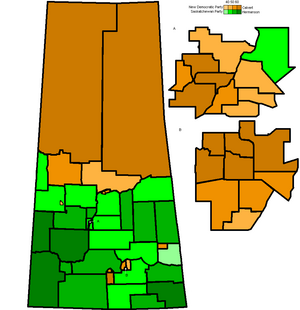Saskatchewan general election, 2003
|
|
|||||||||||||||||||||||||||||||||||||||||||||||||||||||||||||||
|
|||||||||||||||||||||||||||||||||||||||||||||||||||||||||||||||
|
|||||||||||||||||||||||||||||||||||||||||||||||||||||||||||||||
|
|
|||||||||||||||||||||||||||||||||||||||||||||||||||||||||||||||
|
|||||||||||||||||||||||||||||||||||||||||||||||||||||||||||||||
The Saskatchewan general election of 2003 was the twenty-fifth provincial election held in the Canadian province of Saskatchewan. It was held on November 5, 2003, to elect the 58 members of the Legislative Assembly of Saskatchewan (MLAs). The election was called on October 8 by Lieutenant Governor of Saskatchewan , on the advice of Premier Lorne Calvert.
Going into the election, the popularity of the New Democratic Party of Saskatchewan (NDP) had declined because of controversy on a number of issues. Voters in this agrarian province were disgruntled because of a mediocre harvest, a disastrous summer for cattle producers – the American border had been closed to Canadian beef due to fears of mad cow disease, and the actions of a member of the NDP Cabinet who was found to have misled the people of the province on the nature of the Saskatchewan Potato Utility Development Company ("SPUDCO"), a publicly owned potato company that was inappropriately characterized as a public-private partnership.
...
Wikipedia


